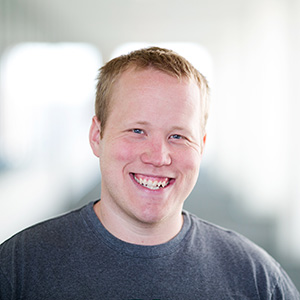"I became an engineer just so I could work for the USPTO."

An Easy Choice
As a corporal in the infantry, U.S. Marine Corps veteran Eric Eide spent his days at Camp Lejeune training at the ranges and at the nearby beaches for amphibious training. For Eide, the camaraderie was an unforgettable bonding experience. "I loved my time at target practice and hanging out with the guys," he said.
Still, after four years of military service, Eide was ready for a career change. Seeing how much his wife, a patent examiner, loved her job at the USPTO with its award-winning workplace flexibilities, great pay, and benefits, Eide was certain that his next career would involve the agency. In what capacity, however, he was not sure. Eide started networking with other USPTO employees to gain more perspective on what kind of opportunities were available and what skillsets he could apply from his military experience to support the agency's mission. He quickly learned that the agency was looking to hire electrical engineers to become patent examiners. With that knowledge, Eide's career path became clear. He enrolled in George Mason University's Electrical Engineering Program, intent on obtaining his bachelor's degree and becoming a patent examiner. "I became an engineer just so I could work for the USPTO," said Eide who now serves as a patent examiner.
Life as a Patent Examiner
The USPTO's Veteran Internship Program and patent examiner training academy prepared Eide for a successful career as a patent examiner. On a typical day he reviews claims, conducts research on prior art (material used to determine if an invention is new or novel), and writes clear, decisive arguments on a determination to grant a patent or not. One of his favorite parts about being a patent examiner is knowing that his work makes a difference. Whether he's talking to pro se applicants (those who file patent applications without the assistance of a registered patent attorney or agent) or applicants with representation, inventions that are granted patents through the USPTO go on to help advance humanity, create jobs, and improve how our world functions. Eide works in an art unit that covers optics. He currently works on applications focused on "illuminations" related to lamps, car headlights, back light panels, and devices with a light source. He applies the discipline and drive that he learned in the military to his role as a patent examiner, which is reflected in his career trajectory. Eide was promoted twice within his first two years and is currently pursuing "Full Signatory Authority," which grants an individual patent examiner the authority to make patent ability decisions independently.
Strong Veteran Community, Dedicated Leadership
The USPTO is known among the veteran community for being an employer where transitioning servicemembers can thrive both professionally and personally. That commitment to veteran success at the USPTO starts at the very top. "Veterans at this agency have a strong track record of success as well as access to a community of veteran leaders who help mentor you as you grow," said Eide.
Balance in Challenging Times
Eide has personally benefitted from the agency's dedication to supporting veterans through career advancement programs, the USPTO Military Association affinity group, award-winning telework programs, and work schedule flexibilities - all of which further distinguish the agency as a top employer. An understanding and empathetic employer is never more important than during challenging times. With the onset of the global pandemic in 2020, Eide and his wife already had the flexibilities they needed firmly in place to care for their children while continuing to do the work that they love safely from home. "I don't think it's hyperbole that the agency's established workplace flexibilities helped to save lives," he said. "The USPTO cares about its employees and continues to demonstrate that the health and well-being of its workforce is a top priority."
